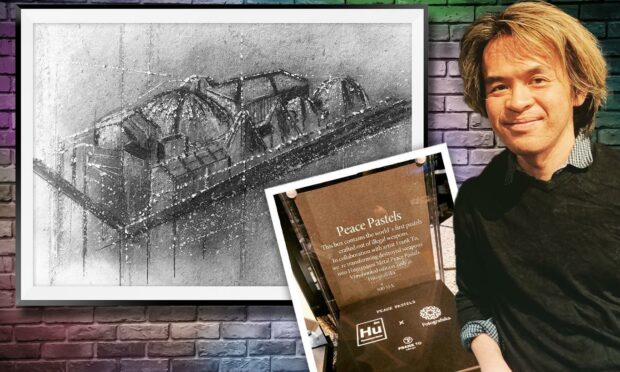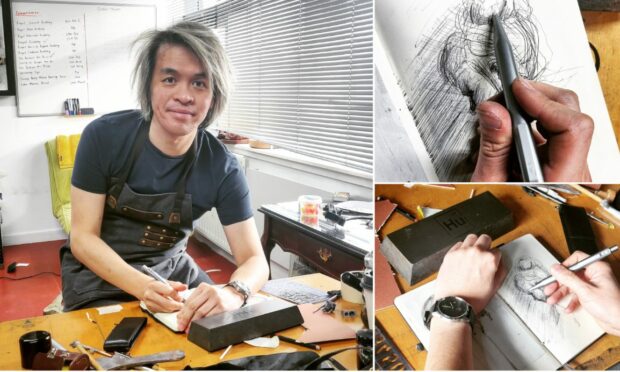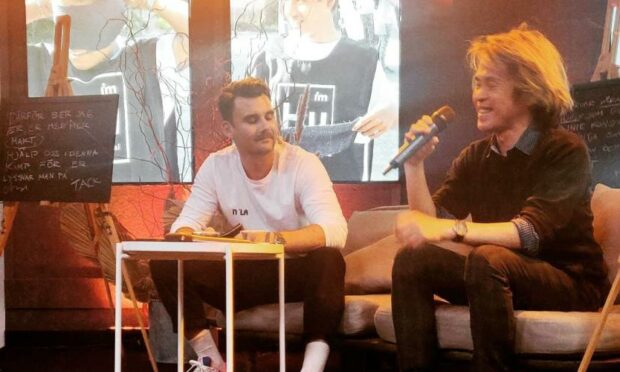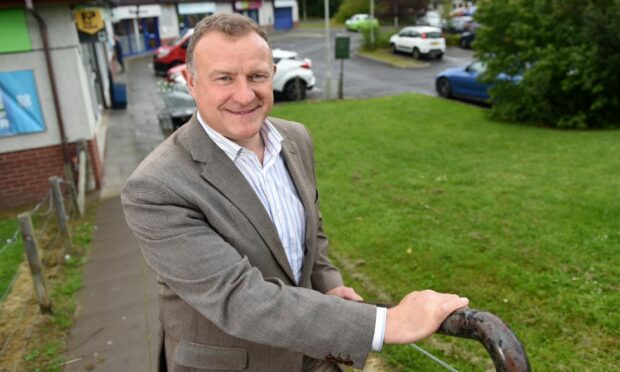Internationally-renowned artist Frank To wants Inverness to become the centre for research into a new metal created from destroyed illegal firearms.
The Inverness College UHI lecturer has worked for three years on the humanium Metal Art Project, developing an alloy made from illicit weapons.
His latest creation, limited edition sets of soft pastels made from humanium metal, is being showcased in Stockholm to address growing gun violence in Sweden.
The first piece of art using the pastels was created by Frank during the Cop26 climate summit where he spoke about combatting global gun violence and recycling firearms.
It was bought by the University of Cambridge for a four-figure sum at auction.
Using destroyed firearms in a sustainable way
Frank already includes his work on humanium in his art lectures at Inverness College and hopes to take his research a stage further.
“I’m the only one in the UK researching the metal and the possibility of using this material in art and art making.
“It is creating an awareness in the Highlands and I’d like the college to become the main research facility for humanium metal and the destruction of firearms into an alloy that can be used in a sustainable way.
“Because the college has been so supportive, it’s allowed me to incorporate my research into my teaching on upcycling materials, particularly harmful materials like guns, to create something more sustainable and meaningful to society.”
He adds: “Students find it fascinating when I bring in a humanium metal bar and tell them what it’s made from, which could be the components of an AK47.
“They are very interested in the project and feel they have a moral obligation to contribute to the concept of a world without illegal gun violence.”
Inverness College UHI is exploring the idea.
Sharon MacFarlane, tertiary education leader for creative and cultural industries at the college, said: “We’re keen to support staff to be research active, particularly in sustainable practice, and are always looking to identify new research opportunities that will benefit our communities.
“Frank’s work with humanium metal is an excellent example of the power of art and the influential role it can have in addressing societal issues.
Frank To’s work ‘an inspiration to students’
“His practice is an inspiration to our contemporary art students who are encouraged to use their art to express, question and challenge.”
In September, Inverness Nairn Badenoch and Strathspey MP Drew Hendry helped sponsor an Early Day Motion in the UK Parliament to recognise Frank’s “dedication to global peace through art”.
Mr Hendry said: “I find Frank’s work with humanium metal incredibly inspiring, and I was pleased to raise a motion in support of his work in Parliament earlier this year.
“The idea that art can be created using humanium alloy, which is made by melting down illegal firearms seized in conflict zones, is not only a great innovation, but also an artistic dedication to global peace.
“That Inverness could be at the centre of the development of this material for other purposes is certainly an exciting prospect.”
Frank’s socially-activated art has previously seen him create works from soot, smoke, gunpowder and even Boris Johnson’s letters during the Covid pandemic.
Hopes of a world without illegal guns
He produced a series of Covid-themed artworks, using images from a 2011 project on plague doctors, as a comment on the financial and environmental cost of sending out millions of messages at the start of lockdown.
For the last three years he has been working with IM Swedish Development Partner developing art from humanium.
He created the first artwork using a pen made from humanium. The limited edition ‘peace pastels’ made their debut at the Armed Art event at the Fotografiska Museum in Stockholm.
The seven boxes, each containing seven pastels, have become art works in their own right and will be used to create public art displays in areas affected by gun violence.
Frank, a favourite of Star Trek legend Patrick Stewart, said: “I’m a Scottish artist, it is crucial that I represent Scotland’s shared view on addressing and being pro-active on the destruction of unlawful weapons, especially guns.
“I only hope that these gun pastels are the first steps to a world without illegal firearms.”
He added: “Artists tend to make pictures or images, what I’m focusing on is the core material.
“It has a major social and political impact to transform one material that is used to kill into objects that are used to create and create awareness.”



